PHOTO LIVE
21.4.20
We are pleased to announce PHOTO LIVE – a series of live streamed conversations about the social and cultural role photography plays in our lives, addressing a range of issues from identity and belonging to human rights and social justice.
The first season of PHOTO LIVE features Cristina de Middel, Hoda Afshar, Adam Broomberg, Hayley Millar-Baker, Eliza Hutchison, Atong Atem and Sara, Peter & Tobias.
Broadcast between 23 April and 10 May 2020 – the intended dates for PHOTO 2020 International Festival of Photography – PHOTO LIVE explores contemporary photographic practice and its relationship to truth. The conversations will cover a variety of topics including social media, surveillance, self-representation, Indigenous stories, politics and systems of belief.
In response to the unfolding health crisis, PHOTO 2020 has been postponed and will be presented as PHOTO 2021, taking place from 18 February to 7 March 2021.
The second series will be held in July 2020.
Thursday 23 April, 6pm AEST
Sara, Peter & Tobias
In conversation with Elias Redstone (Artistic Director, PHOTO 2021)
Monday 27 April, 6pm AEST
Eliza Hutchison
In conversation with Brendan McCleary (Producer, PHOTO 2021)
Thursday 30 April, 6pm AEST
Hoda Afshar and Adam Broomberg
Monday 4 May, 6pm AEST
Hayley Millar-Baker
In conversation with Nanette Orly (Assistant Curator, Murray Art Museum Albury)
Thursday 7 May, 10am AEST
Cristina de Middel
In conversation with Rachel Ciesla (Producer, PHOTO 2021)
Sunday 10 May, 6pm AEST
Atong Atem
In conversation with Dr Léuli Eshrāghi (Artist, curator and PHOTO 2021 advisor)
PHOTO LIVE will be broadcast live on the PHOTO 2021 Facebook page. Each conversation will last approximately 30 minutes.
Featured Artists

Sara, Peter & Tobias
In 2015, Sara Brincher Galbiati, Peter Helles Eriksen and Tobias Selnaes Markussen formed a artistic collective in which they document subject matters that revolve around disputed interpretations of reality. They place themselves in the intersection between traditional documentary and art photography. The collective has a conceptual approach which examine issues founded on theories and first-person accounts alongside hard facts. They utilize an anthropological method of combining photography and extensive research. Throughout their projects they share and collaborate on every aspect of the process – from research, interviewing, shooting pictures to editing the final photos and text.
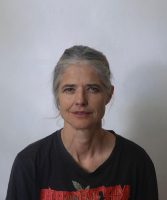
Image: Charles Bickford
Eliza Hutchison
Placed firmly within our present cultural and historical contexts Hutchison’s work explores how truth and meaning can be manipulated and hybridized, feeding and shaping our understanding of mass culture and identity. Experimental in her approach to photography her work explores various modes of in-camera and algorithmic abstraction. It explores the digital reception of imagery its aesthetics and its effects in the fluid formation of our consciousness where the personal and political are presented on interact on the same digital platforms and on the same interface. Her work explores the collision of the personal, and the larger social, political and media structures where authenticity and truth are rendered highly relative and abstract. Highlighting the political underpinnings of our no longer private worlds, her work explores the boundaries of the photographic medium to challenge and refract the information and meaning.
Hutchison was born in Johannesburg, South Africa 1965 and currently lives and works in Melbourne. Hutchison was educated at University of NSW and RMIT Melbourne where she studied film, psychology, sculpture and photography. Hutchison has worked as educator in design and art theory at RMIT Swinburne University during the 90’s at the time working principally in installation and sculpture before her focus shifted more directly to image production.
Hutchison has exhibited widely in Australia and Asia including more recent exhibitions including a commission by Isobel Parker-Philip for the National, ‘The difference between the eternal and infinite’ at the AGNSW, Image-Reader, CCP, curator, Madé Spencer-Castle, An unorthodox flow of images, Centre for Contemporary Photography, 2018, curator Pip Miln, and Naomi Cass; Melbourne Now, 2004, National Gallery of Victoria; Family Photos B, Bus Projects; 2016; Balnaves Contemporary AGNSW 2013 and Balancing the Bandwagon, Murraywhite Room, 2016 and Artificial and Supernatural Tokyo Metropolitan Museum of Photography. Hutchison recently published her first monograph titled Family Photos, published by Perimeter Editions which was shortlisted for the ICP New York book award 2018 and Momento Pro Australian and New Zealand book award 2017.
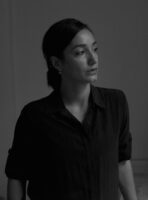
Hoda Afshar
Hoda Afshar (born 1983, Tehran. Iran) lives and works in Melbourne. She is a visual artist and also lectures in photography and fine art. Hoda’s work has been widely exhibited locally and internationally and published online and in print. Her work is also part of numerous private and public collections. Through her work, she explores the nature and possibilities of documentary image-making. Working across photography and moving-image, she considers the representation of gender, marginality and displacement. Recent exhibitions include Remain, UQ Museum of Art in Brisbane (2019), Beyond Place, Museum of Photographic Arts, San Diego CA, USA (2019), Primavera 2018, Museum of Contemporary Art, Sydney and Waqt al tagheer: Time of Change, ACE Open, Adelaide (2018). In 2015, she received the National Photographic Portrait Prize, National Portrait Gallery and in 2018 won Bowness Photography Prize, Monash Gallery of Art, Australia.
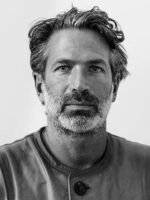
Adam Broomberg
Adam Broomberg and Oliver Chanarin live and work between London and Berlin. They are professors of photography at the Hochschule für bildende Künste (HFBK) in Hamburg and teach on the MA Photography & Society programme at The Royal Academy of Art (KABK), The Hague.
Together they have had numerous solo exhibitions including at The Centre Georges Pompidou (2018) and the Hasselblad Center (2017). Their participation in international group shows include the Yokohama Triennale (2017), Documenta (2017), The British Art Show 8 (2015-2017), Conflict, Time, Photography at Tate Modern (2015); Shanghai Biennale (2014), and the Gwanju Biennale (2012). Their work is held in major public and private collections including Pompidou, Tate, MoMA, Yale, Stedelijk, V&A, the Art Gallery of Ontario, Cleveland Museum of Art, and Baltimore Museum of Art. Major awards include the ICP Infinity Award (2014) for Holy Bible, and the Deutsche Börse Photography Prize (2013) for War Primer 2. Broomberg and Chanarin are the winners of the Arles Photo Text Award 2018 for their paper back edition of War Primer 2, published by MACK.
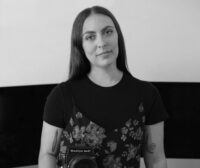
Image: Jade Florence
Hayley Millar-Baker
Hayley Millar-Baker is a contemporary artist known for her photographic works. Utilising a variety of narrative techniques, Millar-Baker seeks to recover and recount sequestered histories – engaging with stories connected to her Gunditjmara and Anglo-Indian bloodlines. Most recently, Millar-Baker won the Darebin Art Prize (2019), and has been selected for; Primavera (2018), Melbourne Arts Trams as part of the Melbourne International Arts Festival (2018), and showcased within the Ramsay Art Prize (2019), the John Fries Award (2019), The Josephine Ulrick and Win Shubert Photography Award (2018) and 65th Blake Prize (2018). Her work has been exhibited nationally including the PHOTO2020 International Photography Festival (2020), Sydney Festival (2018), TARNANTHI: Festival of Contemporary Aboriginal and Torres Strait Islander Art (2019, 2017), HoBiennale (2017), Ballarat International Foto Biennale (2017), and Yirramboi Festival (2019, 2017).
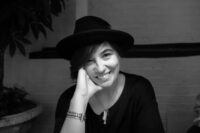
Image: MP Bernardoni
Cristina de Middel
Cristina de Middel is a Spanish photographer whose work investigates photography’s ambiguous relationship to truth. Blending documentary and conceptual photographic practices, she plays with reconstructions and archetypes that blur the border between reality and fiction.
After a 10 year career as a photojournalist and humanitarian photographer, de Middel stepped outside of the photojournalistic gaze. She then produced the critically acclaimed series The Afronauts in 2012, which explored the history of a failed space program in Zambia in the 1960s through staged reenactments of obscure narratives.
Since 2012 De Middel has been continuously producing new bodies of work that aim at redefining what documentary can be and at completing the limited description of the world that mass media provide. De Middel’s work shows that fiction can serve as the subject of photography just as well as facts can, highlighting that our expectation that photography must always make reference to reality is flawed.
With more than 13 books published, Cristina De Middel has exhibited extensively internationally and has received numerous awards and nominations, including PhotoFolio Arles 2012, the Deutsche Börse Prize, the Infinity Award from the International Center of Photography in New York and the Spanish National Award in Photography.
Cristina de Middel is a Magnum Associate and lives and works between Mexico and Brazil.
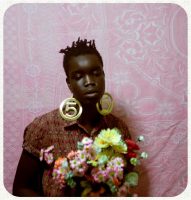
Atong Atem
Atong Atem is an Ethiopian born, South Sudanese artist and writer living in Narrm/ Melbourne. Atem’s photographic practice explores migrant narratives, postcolonial practices in the African diaspora, and concepts of identity, home, and liminal space. Her dynamic portraiture references widely, from Malick Sidibe and Seydou Keita to science fiction writer Octavia Butler. She was awarded the inaugural National Gallery of Victoria and MECCA M-Power scholarship in 2018 and the Brisbane Powerhouse Melt Portrait Prize in 2017.